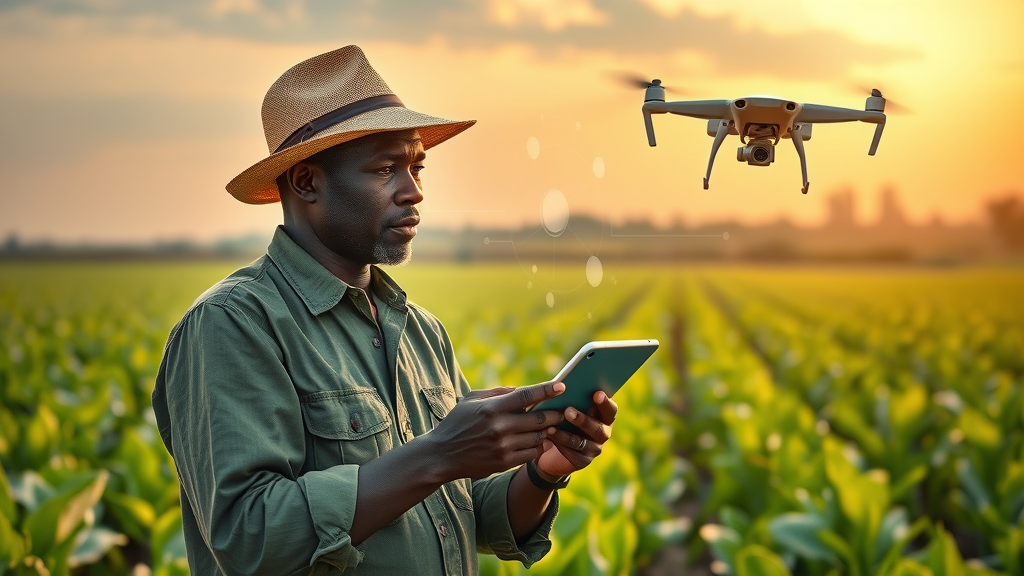- In 2024, African AI startups raised an unprecedented $500 million—doubling investment figures from two years ago. This signals a dramatic shift not just in tech investment flows, but in the continent’s technological ambitions and capabilities.

Why African AI Startups Are Shaping the Future of Artificial Intelligence
- African AI startups are leveraging cutting-edge artificial intelligence to address unique local challenges, drive economic growth, and transform entire industries across Africa.
African AI startups stand at the forefront of a technology renaissance. Unlike generic global AI startups, Africans are using artificial intelligence to solve deeply local challenges, from agricultural forecasting to healthcare diagnostics in remote regions. This rapidly evolving ecosystem drives economic growth and positions the continent as a leader in real-world, impactful AI solutions . The surge in African AI investment is more than venture capital; it’s a testament to the continent’s rising innovation index and the youth shaping tomorrow’s AI. With the world’s youngest workforce, these startups nimbly adapt machine learning and data science to multitudes of African languages, climates, and economies. Such adaptability, combined with a strong grasp of local needs, makes African AI startups ideally positioned to launch scalable, ethical, and inclusive AI models.
What’s striking is how these AI startups turn adversity into opportunity. Poor infrastructure? AI models help optimize it. Limited access to doctors? Computer vision powers quick, accurate diagnoses. Regulatory gray areas? Startups help design frameworks for responsible AI growth. The impact is undeniable: transformative AI solutions that not only solve Africa’s biggest challenges but also inspire the global AI community. This is why the world is watching African AI startups—and why their influence on artificial intelligence will only deepen in 2025 and beyond.
What Makes African AI Startups Unique in the Global Startup Ecosystem?
- Factors like resourcefulness, a focus on scalable impact, and leveraging the youngest workforce in the world set African AI startups apart from global counterparts.
In the global AI startup landscape, African AI startups shine thanks to a blend of creativity, efficient resource management, and mission-driven growth. Unlike their Silicon Valley peers, African startups innovate with essentials—making limited bandwidth work for real-time agricultural monitoring, or stretching tiny budgets to train impactful AI models . Their focus isn’t just profit; it’s scalable, region-wide impact, prioritizing solutions for food security, financial inclusion, and accessible healthcare across vast demographics. The continent’s young workforce plays a vital role. Tech-savvy, multilingual, and eager to improve livelihoods, these skilled professionals quickly adopt machine learning and deep learning techniques. They code in multiple African languages , train data science models tailored to local dialects, and design interfaces that resonate with their communities. This creates solutions that are both technically robust and culturally relevant—qualities that global AI solutions often lack.

There’s also a collaborative spirit unique to African AI startups. Platforms like Zindi connect data scientists continent-wide through open competitions, accelerating both talent growth and viable AI innovations. And unlike isolated tech hubs elsewhere, African startups often share resources, datasets, and investor contacts. It’s this ecosystem-wide teamwork, grounded in real-world impact, that’s sparking an African-led surge in global AI—and drawing attention from investors and policymakers around the globe.
Innovative Sectors: How African AI Startups Are Revolutionizing Tech Industries
Healthcare Disruption: African AI Startups Reshape Medical Diagnostics
- Top African AI startups empower clinics with tools for disease detection, automating triage, and remote diagnostics—a breakthrough for underserved regions.
Artificial intelligence is dramatically reshaping healthcare delivery in Africa. By automating triage and enabling rapid, remote medical diagnostics, African AI startups like Ubenwa and Vula Mobile offer solutions that revolutionize access to care in low-resource settings. Through computer vision and audio analysis, these AI startups reduce wait times, increase diagnostic accuracy, and empower frontline health workers to screen for diseases using only a smartphone. Beyond diagnostics, startups integrate data analytics to monitor outbreaks, optimize medicine distribution, and predict public health challenges. mPharma, for instance, uses AI models to forecast medication demand and track inventory in real time, cutting supply chain inefficiencies. By merging innovation with local expertise, African ai solutions are setting new global standards in healthcare , making life-saving technology available to millions previously neglected by traditional systems.
With ongoing breakthroughs in deep learning and AI-powered remote consultations, the continent’s health sector is on a trajectory to outpace many Western counterparts in digital transformation. African startups are not just users of AI in medicine—they’re creators and collaborators, shaping the future of global healthcare one AI model at a time.
FinTech and Payment Solutions: Artificial Intelligence for Financial Inclusion
- AI startups like those in Kenya and Nigeria utilize artificial intelligence for fraud detection, credit scoring, and personalized banking.
The FinTech sector is another hotbed for African AI startups . Leveraging artificial intelligence for fraud detection, loan underwriting, and digital payment platforms, companies like Flutterwave, Curacel, and M-TIBA are democratizing financial access. Smart algorithms, often built on machine learning and data analytics , process transactions in real time , reducing risk and manual review periods for both consumers and lenders. Unbanked populations, often underserved by traditional banks, now benefit from AI-powered credit scoring that uses alternative data—like mobile usage or social media signals—to evaluate loan eligibility. This not only combats systemic bias, but drives financial inclusion across rural and urban markets. AI solutions for claims processing, digital wallets, and personalized customer journeys are transforming everyday banking, making it safer, more transparent, and accessible.
For global AI observers, African FinTech startups are models of speed and scalability. They harness AI technology to cater to rapidly digitizing populations, and set a precedent for leveraging artificial intelligence in high-impact, inclusive financial systems. Their innovations continue to attract both local and global investors looking for the next AI breakthrough.
Agricultural Innovation: How African AI Startups Redefine Food Security
- From satellite crop monitoring to pest prediction, African AI startups bring tech innovation to agriculture, directly impacting food supply chains.
Food security is a top priority across the continent, and African AI startups are making significant strides in agricultural technology. Companies such as Aerobotics, Releaf, and Apollo Agriculture utilize deep learning and data science to monitor crops via drones, predict pest infestations, and optimize farming inputs. Through environmental data and real-time analytics, farmers enhance quality and yield, making modern precision agriculture a reality for smallholders and large agribusinesses alike. These AI solutions give farmers affordable access to advanced forecasting, smarter irrigation controls, and early warning systems—all custom-fitted to unique African climates and crop cycles. Hello Tractor’s AI-powered platform, for example, connects farmers with machinery via mobile apps, increasing efficiency throughout the supply chain. With increasing adoption of machine learning and computer vision, the agricultural sector is evolving to meet continental food demand and drive export competitiveness.

These agricultural breakthroughs don’t just improve yields—they stabilize food prices, predict market trends, and create sustainability. By integrating AI into food security efforts, African startups prove that scalable, global AI solutions can emerge from even the most resource-constrained environments.
Smart Cities: Artificial Intelligence Powering Urban Development in Africa
- Startups use artificial intelligence for traffic optimization, utility management, and urban planning, making African cities smarter and more sustainable.
With rapid urbanization, African AI startups are leading advances in smart city infrastructure. Artificial intelligence is embedded in traffic management systems, energy grids, and urban planning platforms—making cities more livable, connected, and sustainable. Startups such as OkHi and Raise use AI models for digital address verification, resource allocation, and predictive maintenance of city infrastructure. By analyzing patterns in traffic, power consumption, and waste disposal, these companies aid city planners in combating congestion, optimizing utilities, and ensuring equitable development. Real-time data flows are visualized across platforms, empowering public officials with actionable insights for better, citizen-focused decision-making. As a result, cities like Lagos, Nairobi, and Cape Town are quickly becoming showcases for smart, AI-driven urban development.
The impact stretches beyond convenience; intelligent city systems are improving safety, reducing energy waste, and helping communities prepare for climate challenges. Once again, African AI startups provide replicable models for global AI innovators tackling the next wave of city-scale digital transformation.
Ranking the Top 25 African AI Startups Revolutionizing Tech in 2025
- InstaDeep (Tunisia/Nigeria): Accelerating AI-powered enterprise solutions in healthcare, logistics, & autonomous mobility
- DataProphet (South Africa): Deep learning for manufacturing optimization
- Aerobotics (South Africa): Smart agriculture with drone data analytics
- Ubenwa (Nigeria): Infant cry analysis for early health diagnostics
- Zindi (South Africa/Pan Africa): Data science competition platform driving African AI innovation
- Vula Mobile (South Africa): AI-driven mobile triage in emergency healthcare
- mPharma (Ghana/Nigeria): Optimizing pharmaceutical supply chains with AI
- Releaf (Nigeria): Machine intelligence for agri-processing
- CreditEnable (Pan Africa): AI-powered SME financing solutions
- Fastagger (Kenya): Data annotation for global AI clients
- AIfluence (Kenya): AI-based influencer marketing
- Xane AI (Egypt): Conversational AI & virtual assistants
- Flutterwave (Nigeria): AI-driven payment gateway
- OkHi (Kenya): AI-powered digital address verification
- M-TIBA (Kenya): Healthcare financing via AI analytics
- Healthtracka (Nigeria): On-demand health testing using AI
- Curacel (Nigeria): AI for fraud detection in insurance
- Tambua Health (Kenya): AI-powered medical device integration
- Raise (Kenya): AI for private market investment automation
- Mindjoy (South Africa): AI in education technology
- Apollo Agriculture (Kenya): AI-powered smallholder farmer support
- Rwazi (Mauritius): Data-driven business intelligence using AI
- Enlabeler (South Africa): Data labeling for training African AI models
- Hello Tractor (Nigeria): AI-powered smart tractors
- Eversend (Pan Africa): AI-powered multi-currency wallet.
These AI startups span a diverse range of industries and regions, each leveraging artificial intelligence to solve Africa’s—and the world’s—most pressing issues. Whether it’s data science for smart farming in Cape Town or AI technology for urban finance in Lagos, this curated list highlights the leaders in innovation and impact for 2025.
These African AI startups not only provide inspiration but are also creating tangible change, influencing AI adoption on a global scale. Their success signals the transformative potential that such startups hold, not just for African economies but for shaping the ethical and technical direction of international AI development.
The Founders and Visionaries Behind Top African AI Startups
- Learn about inspiring leaders propelling African AI startups forward, such as Karim Beguir (InstaDeep), Wuraola Oyewusi (Ubenwa), Francois Swart (Aerobotics), and Timi Ajiboye (Eversend).
Behind the surge of African AI startups are a dynamic group of tech visionaries and determined entrepreneurs. From Karim Beguir, whose InstaDeep has pioneered AI-powered enterprise solutions, to Wuraola Oyewusi’s innovative work at Ubenwa transforming infant healthcare, these innovators push boundaries in artificial intelligence. Francois Swart at Aerobotics has led AI-driven reforms in smart agriculture, using deep learning and computer vision to empower farmers with actionable insights. Timi Ajiboye’s Eversend is revolutionizing cross-border payments, showing how AI startups can scale across continents. Each of these founders possesses a mix of technical expertise and community-first leadership, mentoring the next generation of data scientists and AI engineers. Their collective work not only advances the state of AI in Africa but influences global perspectives on what’s possible with resourceful innovation.

The narratives of these pioneers highlight how a single African founder can catalyze entire industry shifts. They are featured speakers at international AI events, authors of technical papers, and leaders who prioritize inclusive innovation—a crucial driver of Africa’s digital leap in 2025.
Fastest Growing African AI Startups in 2025: Market Leaders by Sector
- Get to know the fastest risers in FinTech, Healthcare, AgriTech, Urban Tech, and EdTech, based on user base, Innovation Index, and investor funding.
| Startup | Country | Sector | 2025 Funding | Market Reach |
|---|---|---|---|---|
| InstaDeep | Tunisia/Nigeria | Enterprise AI | $100M | 30 countries |
| DataProphet | South Africa | Manufacturing | $45M | 12 countries |
| Aerobotics | South Africa | Agriculture | $30M | 10 countries |
| Flutterwave | Nigeria | FinTech | $70M | 20 countries |
| mPharma | Ghana/Nigeria | Healthcare | $40M | 15 countries |
These rising AI startups have scaled beyond their home countries, setting benchmarks for innovation and AI models on the global stage. Each company’s ascent is powered by a blend of technical expertise, investment backing, and a deep understanding of sector-specific challenges. Startups from South Africa, Nigeria, and Tunisia are especially dominant, driven by both homegrown talent and international JV partnerships.
The table highlights major players in enterprise AI , manufacturing , agriculture, and finance—domains where artificial intelligence is rapidly moving from pilot projects to mainstream, high-impact commercial products. These brands epitomize the competitive, fast-paced growth that defines African AI in 2025.
Case Study: How African AI Startups Are Solving Real-World Challenges
- In-depth analysis of how African AI startups like Releaf and mPharma use artificial intelligence to address local supply chain, healthcare, and logistics gaps.
Take Releaf, a Nigerian AI startup reshaping agricultural supply chains. Through AI-powered data analytics and machine intelligence, Releaf links rural farmers to efficient processing facilities, drastically cutting food loss and boosting local economies. The company's computer vision and predictive analytics optimize logistics routes, enabling faster and less wasteful produce deliveries—even in areas with poor infrastructure. Meanwhile, mPharma fuses artificial intelligence and deep learning to streamline pharmaceutical supply chains across West Africa. Their real-time monitoring systems anticipate shortages and automate inventory decisions, ensuring vital medications reach clinics even during supply disruptions. Through strategic partnerships with manufacturers and pharmacies, mPharma’s AI solutions also enhance drug safety and combat fraud in healthcare.

These case studies underscore how African AI startups have mastered the art of local adaptation—building AI models that fit distinctly African infrastructure and market needs. It’s this localized problem-solving that has global relevance, proving African startups as key contributors to the next generation of practical and ethical AI technology .
Investor Hotspots: Which African Countries Are Home to the Most AI Startups?
- Explore why Nigeria, South Africa, Egypt, Kenya, and Ghana are emerging as Africa’s top AI startup hubs, attracting global venture capital and government incentives.
The African AI investment map centres on five nations: Nigeria, South Africa, Egypt, Kenya, and Ghana. These countries blend robust digital infrastructure, quality universities, active diaspora communities, and pro-innovation government policies. Nigeria’s booming fintech and healthtech sectors, for example, attract tech investors worldwide, while South Africa’s Cape Town is renowned for its deep learning clusters and AI manufacturing startups. Egypt and Kenya are fast climbing the ranks, thanks to aggressive innovation policies and a wave of upskilled graduates. Ghana, buoyed by a rapidly digitizing economy, is also luring impact investors and venture capital into sectors like healthtech and agri-tech. These hotspots nurture a diverse array of AI startups , with cross-border expansion becoming standard as startups scale beyond their initial markets.
Governments in these nations have responded with attractive tax breaks, funding accelerators, and digital talent programs. This blend of policy and local entrepreneurship establishes these countries as beating hearts of Africa’s AI revolution in 2025.
AI Policy and Support: Which African Countries Have National AI Strategies?
- Track the swift adoption of AI strategies in Egypt, Rwanda, South Africa, and Morocco. See how local policies are fostering African AI startup growth.
Progressive national AI strategies are crucial for nurturing future-ready African AI startups . Egypt, Rwanda, South Africa, and Morocco lead the way, unveiling frameworks covering ethics, skills development, and smart industry support. South Africa’s approach includes extensive data science and AI education initiatives, while Morocco and Rwanda offer regulatory sandboxes that let AI startups quickly pilot new technologies without stifling red tape.
These national strategies prioritize home-grown research, encourage public-private partnerships, and ensure that African languages and contexts remain central. What results is an innovation-rich environment where AI solutions thrive, talent stays local, and ethical guidelines keep scale and impact in check. Africa’s head start in policy-forward AI development sets benchmarks other regions now follow.
Nigeria’s Rise: Exploring the Booming AI Startup Ecosystem in Africa’s Giant
- A spotlight on how Nigerian startups like Ubenwa, Curacel, and Flutterwave are transforming finance, healthcare, and urban life through artificial intelligence.
Nigeria’s AI startup scene is perhaps the continent’s most dynamic. Startups like Ubenwa leverage deep learning for life-saving infant cry diagnostics, earning global acclaim. Curacel’s AI models transform insurance claims processing, reducing fraud and speeding settlements. Fintech success Flutterwave, now Africa’s top digital payment gateway, uses real-time anomaly detection and AI-powered workflows to ensure secure transactions for millions.
What binds them is responsiveness to local needs—whether it’s developing conversational AI platforms for customer support in many African languages, or designing AI solutions for utility billing in bustling cities like Lagos. Nigeria’s startups are proof that the continent’s most populous nation is fast becoming a global leader in applied artificial intelligence.
Key Challenges Facing African AI Startups & the Road Ahead
- Delve into skills shortages, funding gaps, ethical concerns, and the opportunities presented by the continent’s rapidly digitizing markets.
As rapid growth continues, African AI startups face hurdles unique to emerging markets. Skilling and retaining AI engineers is challenging given the global demand for data scientists and deep learning experts. Many startups must innovate within limited funding streams, stretching every dollar to create workable prototypes and scale infrastructure. Ethical questions around data privacy and transparency also loom large. African startups often operate in regulatory limbos, so creating ethical, explainable AI models is both a challenge and an opportunity to set international standards. Notably, Africa’s digital leap means that AI solutions must accommodate low-bandwidth environments, local languages, and rural-urban divides—a complexity many Western AI products don’t face.
Yet these challenges fuel ingenuity. Many startups use open-source data, collaborate continent-wide, and champion responsible innovation. With growing investor interest, expanding local talent, and smarter policy environments, the future is bright for African AI startups determined to turn obstacles into global wins.
"Africa is not just consuming AI; African AI startups are creating world-changing solutions on their own terms." — Dr. Joyce Dlamini, Pan-African tech analyst
Trends Powering African AI Startups in 2025
- Uncover emerging trends such as real-time language processing, predictive analytics for climate tech, and blockchain-AI integration in African startups.
Three dominant trends are shaping African AI in 2025. First, real-time local language processing is becoming the gold standard for customer service, health, and government apps. Companies engineer AI models to recognize sentiment, intention, and even cultural nuance across African languages—a breakthrough in accessibility. Second, predictive analytics for climate tech is empowering farmers, utilities, and cities to anticipate and adapt to weather extremes with unprecedented accuracy. By merging environmental data with machine learning, startups enable smarter irrigation, disaster response, and insurance risk management.

Lastly, blockchain-AI integration is unlocking new levels of trust, transparency, and traceability in African finance and supply chains. Startups are combining generative AI for decision-making with distributed ledgers, radically improving fraud detection and business intelligence. Together, these trends mark a new era, where African AI startups don’t just catch up—they leapfrog ahead in global innovation.
How to Find and Support the Most Promising African AI Startups
- Tips on following accelerator programs, impact investing, and joining the community of African AI startup supporters for 2025.
To support African AI startups in 2025, start by following leading accelerator programs and tech ecosystem platforms—such as the Meltwater Entrepreneurial School of Technology, Google for Startups Africa, and Data Science Nigeria. These programs give you early access to investment opportunities, events, and AI demo days featuring the continent’s brightest talents. Consider impact investing via specialized venture funds like Future Africa or TLcom Capital, both of which actively back African AI solutions in health, fintech, and sustainability. If you want to engage directly, join online forums or subscribe to newsletters that track the African startup scene—Zindi, Tech Cabal, and AfricArena are excellent resources.
By networking with founders, mentoring aspiring AI engineers , or advocating for stronger AI policies, you can play an active role in the global rise of African AI startups . 2025 presents unprecedented opportunities for supporters, investors, and collaborators to join Africa’s tech revolution.
People Also Ask: Who Is the Founder of Africa AI?
- No single individual founded 'Africa AI' as a monolithic entity. Leaders like Karim Beguir (InstaDeep), Ngonidzashe Mutasa (DataProphet), and others have each launched influential African AI startups, contributing to the continent’s growing artificial intelligence ecosystem.
The African AI movement is a collective story. Entrepreneurs from Tunis to Cape Town have founded pivotal companies, but Africa AI isn’t the creation of one person. It’s an ever-growing ecosystem shaped by technical visionaries, community builders, and educators dedicated to transforming how artificial intelligence impacts daily life.
People Also Ask: Which Country Has Most AI Startups?
- Currently, Nigeria and South Africa lead Africa in the number of AI startups thanks to their mature tech ecosystems, access to talent, and investor interest.
Nigeria and South Africa are Africa’s AI powerhouses, home to the continent’s largest number of innovative AI startups . Their blend of talent, urban tech infrastructure, and active investment communities gives these countries a clear lead in developing and deploying AI solutions at scale.
People Also Ask: Which African Countries Have AI Strategies?
- Egypt, South Africa, Morocco, and Rwanda have published national artificial intelligence strategies, while other African countries are also developing similar frameworks to support African AI startups.
Leading the way, Egypt, South Africa, Morocco, and Rwanda have formal AI policies that encompass research, ethics, and education. These strategies enable African AI startups to operate in supportive, forward-looking environments—crucial for building robust and sustainable AI ecosystems.
People Also Ask: Is There Any AI Company in Nigeria?
- Yes, leading AI startups in Nigeria include Ubenwa (health tech), Flutterwave (FinTech), Healthtracka (diagnostics), and Curacel (insurance fraud detection), all leveraging artificial intelligence.
Nigeria boasts several high-profile AI startups . Companies like Ubenwa, Flutterwave, Healthtracka, and Curacel are not only leveraging AI for diagnostics, digital payments, and insurance—each is a blueprint for how artificial intelligence can be ethically deployed for massive social impact in emerging markets.
Frequently Asked Questions About African AI Startups Revolutionizing Tech in 2025
- Which industries are being reshaped by African AI? African AI startups are disrupting healthcare, finance, agriculture, smart cities, and education technology—bringing new levels of efficiency, access, and innovation to each sector.
- Where can I find updates on African AI startups? Follow platforms like Zindi, Tech Cabal, and AfricArena for the latest news, investment trends, and startup successes from across Africa.
- Who provides funding for African AI startups? Investment comes from a mix of African venture funds, international venture capital, government grants, and development institutions focused on technology for impact.
- What are the typical challenges for African AI entrepreneurs? Challenges include limited access to capital, digital infrastructure gaps, data privacy issues, and the ongoing need for AI and data science skills training.
Key Takeaways: How African AI Startups Will Transform the Global Tech Landscape
- African AI startups are not only changing Africa—they’re shaping AI’s ethical, economic, and social future for the entire world.
Ready to Support the Rise of African AI Startups?
- Join venture platforms, mentor aspiring founders, or follow our newsletter to keep tracking the next wave of artificial intelligence innovation from Africa in 2025.
Take action: back accelerators, invest in impactful startups, and champion AI education to fuel Africa’s tech revolution in 2025.
African AI startups are at the forefront of technological innovation, addressing unique challenges and driving economic growth across the continent. For instance, InstaDeep , founded by Karim Beguir, specializes in decision-making AI systems applied in diverse fields such as drug discovery and logistics. In 2022, it partnered with BioNTech to develop an AI program for early detection of COVID-19 variants, leading to its acquisition by BioNTech for $680 million in 2023. ( time.com )
Another notable startup is Amini , established by Kate Kallot in Nairobi. Amini leverages satellite imaging and AI to collect and analyze environmental data, providing critical insights for smallholder farmers and aiding in climate resilience planning. The company has raised $2 million in early-stage funding and is positioned as a leader in environmental data in Africa. ( qa.time.com )
These examples highlight how African AI startups are not only solving local challenges but also making significant contributions to global technological advancements.
 Add Row
Add Row  Add
Add 




 Add Row
Add Row  Add
Add 

Write A Comment